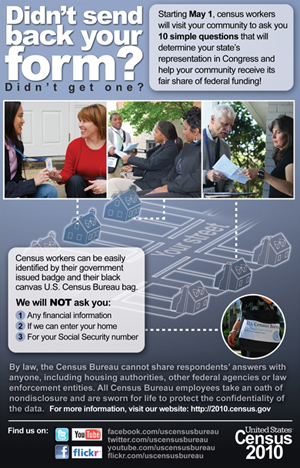
The modern census is done in two parts. First by mail, and then, just like 1790, we go door to door to households from whom we did not collect a form. Starting Saturday, May 1, some 600,000 "enumerators" will be working in their own communities and visiting homes that either didn't return a census form or didn't receive one.
Okay, so you get it, the census is important. It's about political representation and the fair distribution of government funds. But what's equally important is your privacy and security.
All census workers have taken an oath for life to protect the confidentiality of the data they collect. In addition, by law the Census Bureau cannot share your answers with anyone, not housing authorities, not tax authorities, not law enforcement. Not even the President of the
United States can see your answers.
Census workers will be easily identifiable: Each will have an official government badge (identifiable by the seal of the Census Bureau) and a black canvas census bags.
If you have any doubt about whether the person at the door is a census taker, here is a list of what 2010 census workers will NOT ask you for:
1)Your social security number
2)Any personal financial information
3)To come inside your home
A census worker will only ask the 10 questions on the census form. The entire process shouldn't take more than 10 minutes of your time!
So if you see a census worker in your community, remember that your answers determine 1) your state's representation in Congress and 2) how we will allocate $400 billion in federal funds each year over the next decade. These funds are used to support emergency services, schools, senior centers, bridges, tunnels and other public work projects.
By being counted you are standing up for your community's needs, helping your neighbors, and taking care of future generations.
If you haven't mailed back your form, it's OK. Someone from your community will soon be there to help.